In today’s competitive landscape, marketing your plumbing business effectively will make all the difference between merely surviving and thriving.
For plumbers, who rely so much on local visibility and the trust of customers, Google Ads is a game-changing opportunity—one that could help reach customers actively searching for plumbing services.
Google Ads is a powerful tool in aiding plumbers with growing their business because of the precise targeting and measurable results.
In this article, we delve deep into the strategies and benefits of leveraging Google Ads for plumbers—from understanding why it’s essential to mastering the creation and optimization of campaigns.
We will guide you through the steps for success in your marketing efforts.
Let’s start by exploring why Google Ads is so crucial for the plumbing industry.
- Understanding the Importance of Google Ads for Plumbers
- Setting Up Effective Google Ads Campaigns for Plumbing Services
- Crafting Compelling Ad Copy and Utilizing Keywords
- Optimizing Landing Pages for Higher Conversion Rates
- Monitoring and Analyzing Your Google Ads Performance
- Maximizing Plumbing Business Success with Google Ads
- Frequently Asked Questions About Google Ads for Plumbers
Understanding the Importance of Google Ads for Plumbers
As a plumber, you’ve likely wondered how to stand out in a crowded market where customers have so many options.
This is where Google Ads comes into play.
By placing your business directly in front of potential customers searching for plumbing services, you can ensure that your services are not just visible but also easily accessible.
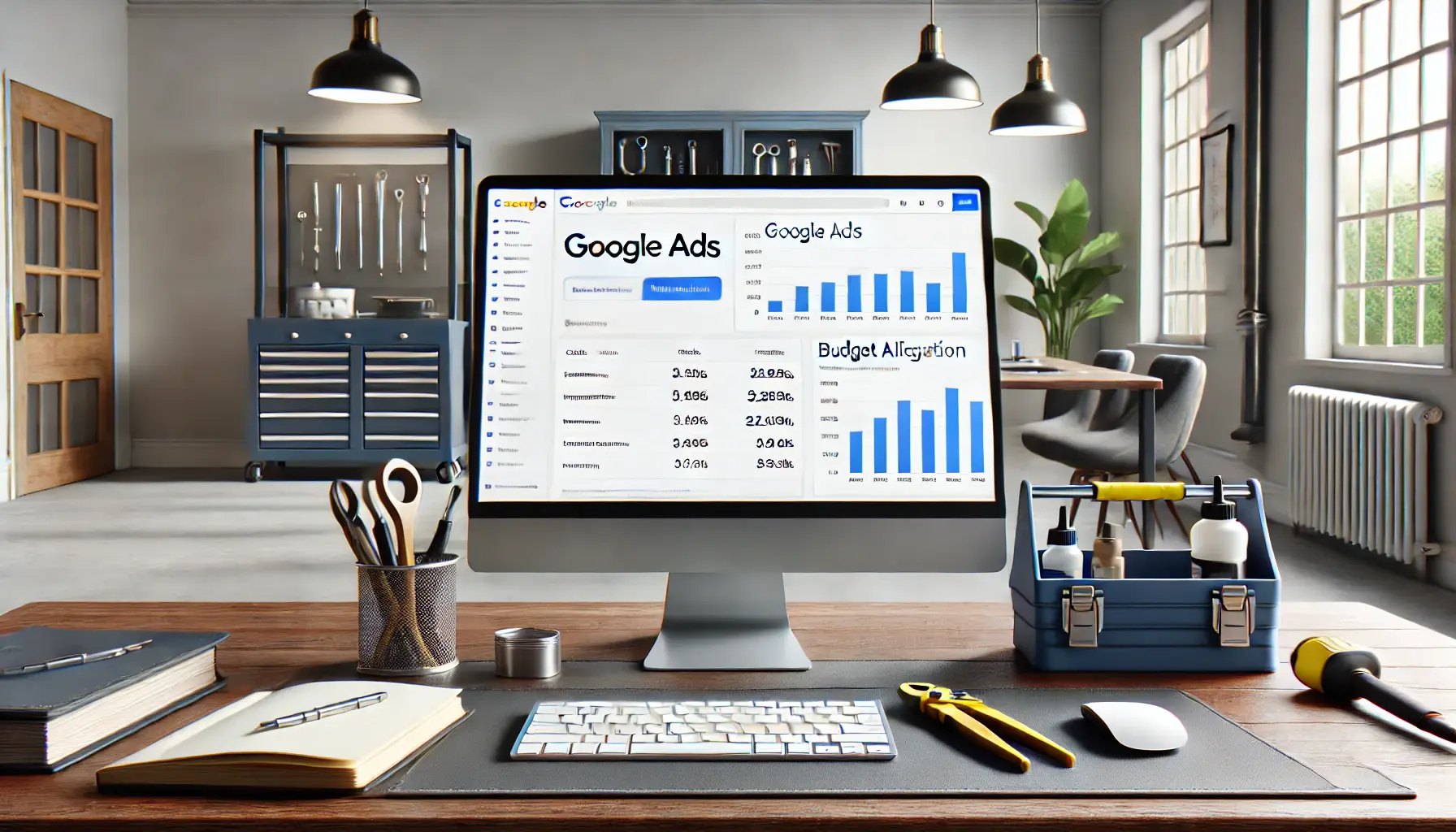
A workspace connecting digital marketing with plumbing services, featuring a Google Ads dashboard.
Why Google Ads Matter in the Plumbing Industry
Google Ads helps plumbers capture the attention of customers at the exact moment they are looking for help.
Unlike traditional methods of advertising, Google Ads can be set to only activate when certain keywords are searched for, such as “emergency plumbing near me” or even “best plumbers in [city]”.
Because these targeted advertisements are shown to users actively seeking services you offer, the chances of conversion greatly improve.
Additionally, Google Ads ensures that you reach local customers.
Since most plumbing jobs are location-specific, geographic targeting ensures that your ads appear only to users within your service area, maximizing your ad spend’s efficiency.
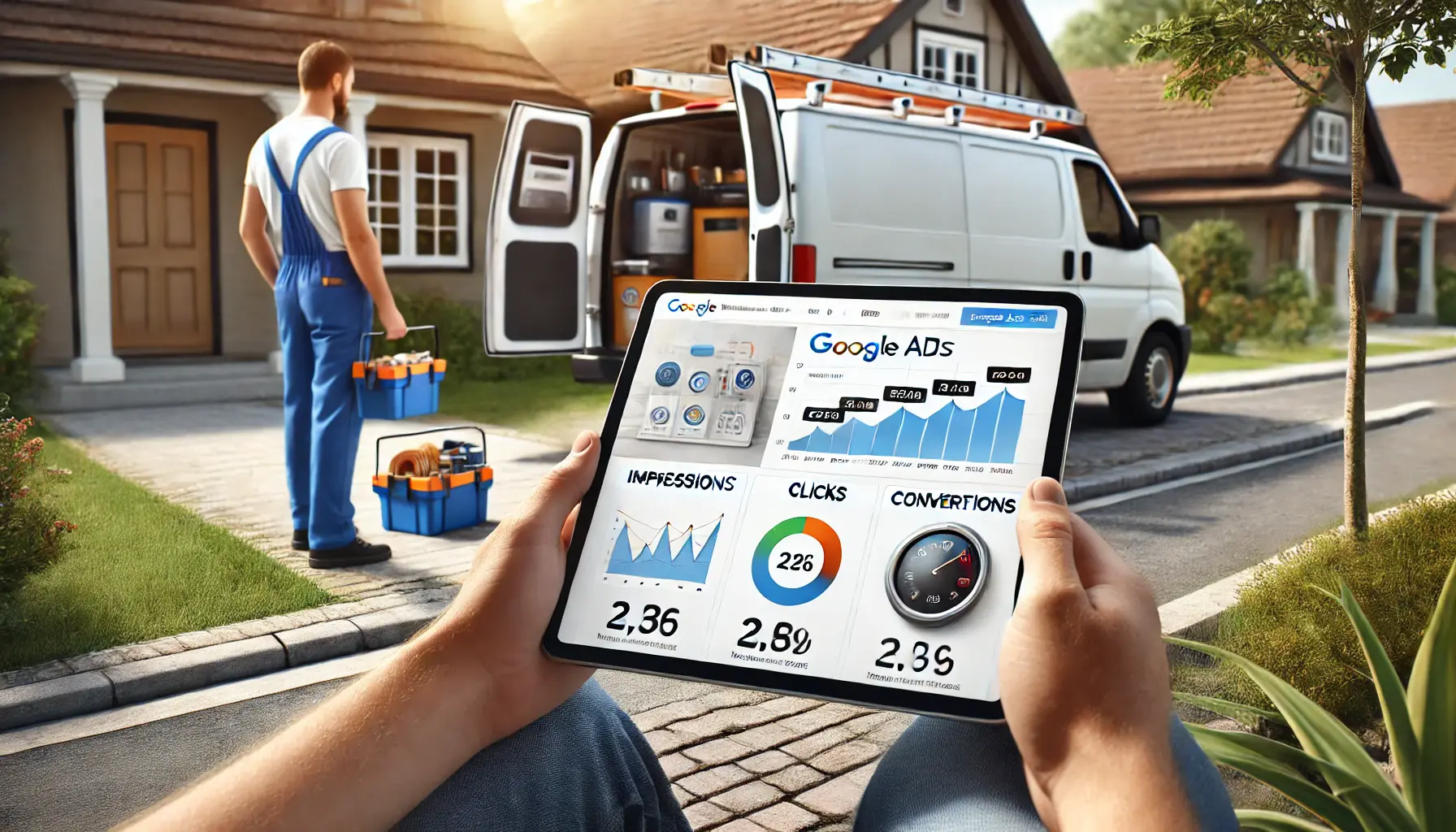
A plumber leveraging Google Ads to optimize business performance, with real-world service readiness.
Benefits of Google Ads for Plumbing Businesses
Investing in Google Ads provides several tangible benefits for plumbers:
- Immediate Visibility: Your business appears at the top of search results, even above organic listings.
- Cost Control: Set your budget and only pay for clicks, ensuring a measurable return on investment.
- Precision Targeting: Focus on specific keywords and geographic areas to reach the right audience.
- Measurable Results: Track performance metrics like clicks, conversions, and cost per lead to refine your campaigns.
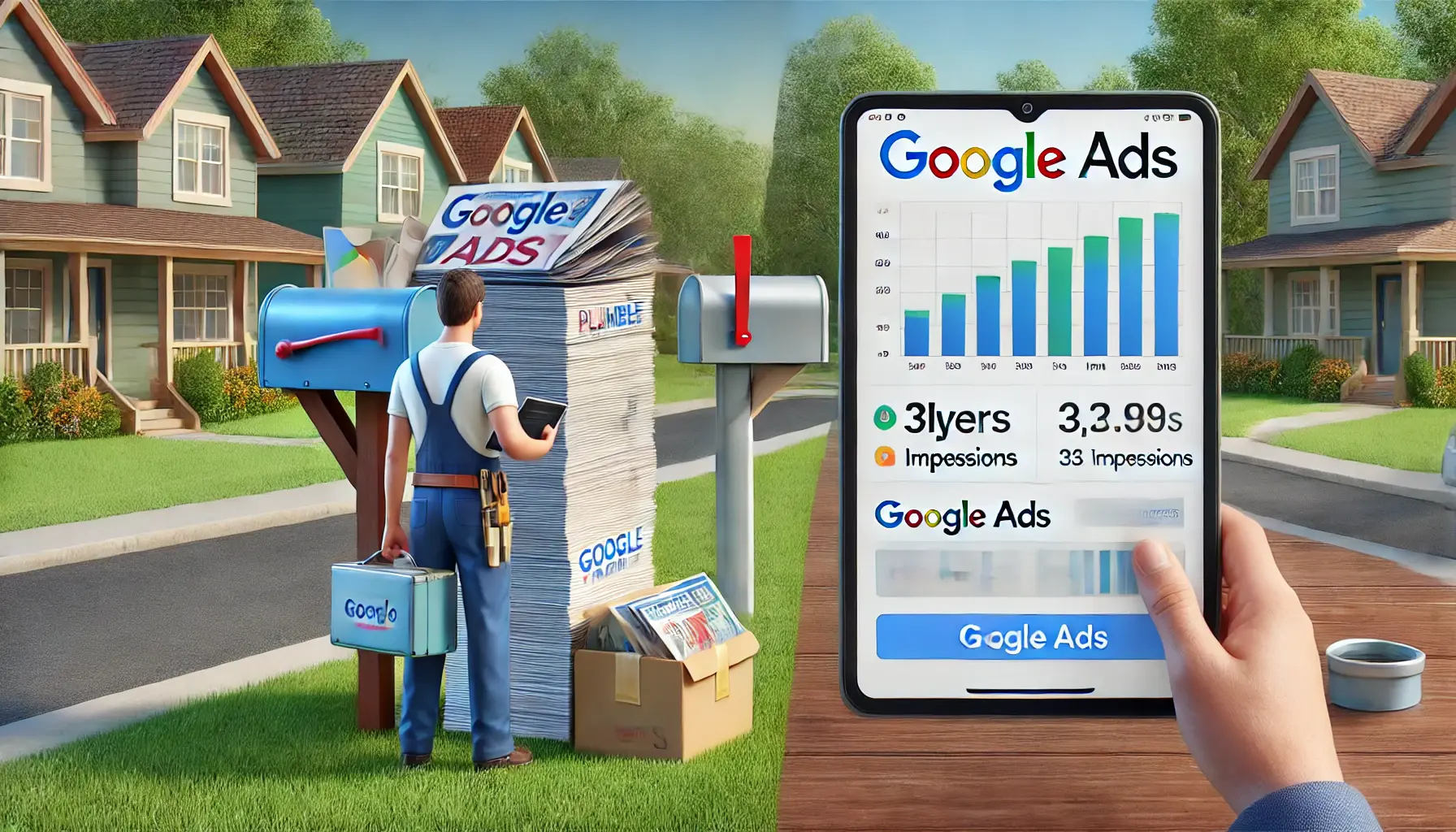
A side-by-side comparison of traditional marketing and modern digital marketing for plumbing businesses.
Comparing Google Ads to Traditional Marketing Methods
Traditional advertising methods like print ads or flyers often cast a wide net, hoping to reach a relevant audience.
While these methods can work, they lack the precision and real-time impact of Google Ads.
With Google Ads, you’re not guessing—you’re reaching people already searching for plumbing services, which translates to higher-quality leads and better results for your business.
By leveraging Google Ads, plumbers can take a proactive approach to marketing, ensuring they remain competitive in an industry that depends on local visibility and quick response times.
In the next section, we’ll explore how to set up effective Google Ads campaigns for plumbing services.
Google Ads ensures plumbers gain visibility at the exact moment potential customers are searching for services, enhancing trust and driving conversions effectively.
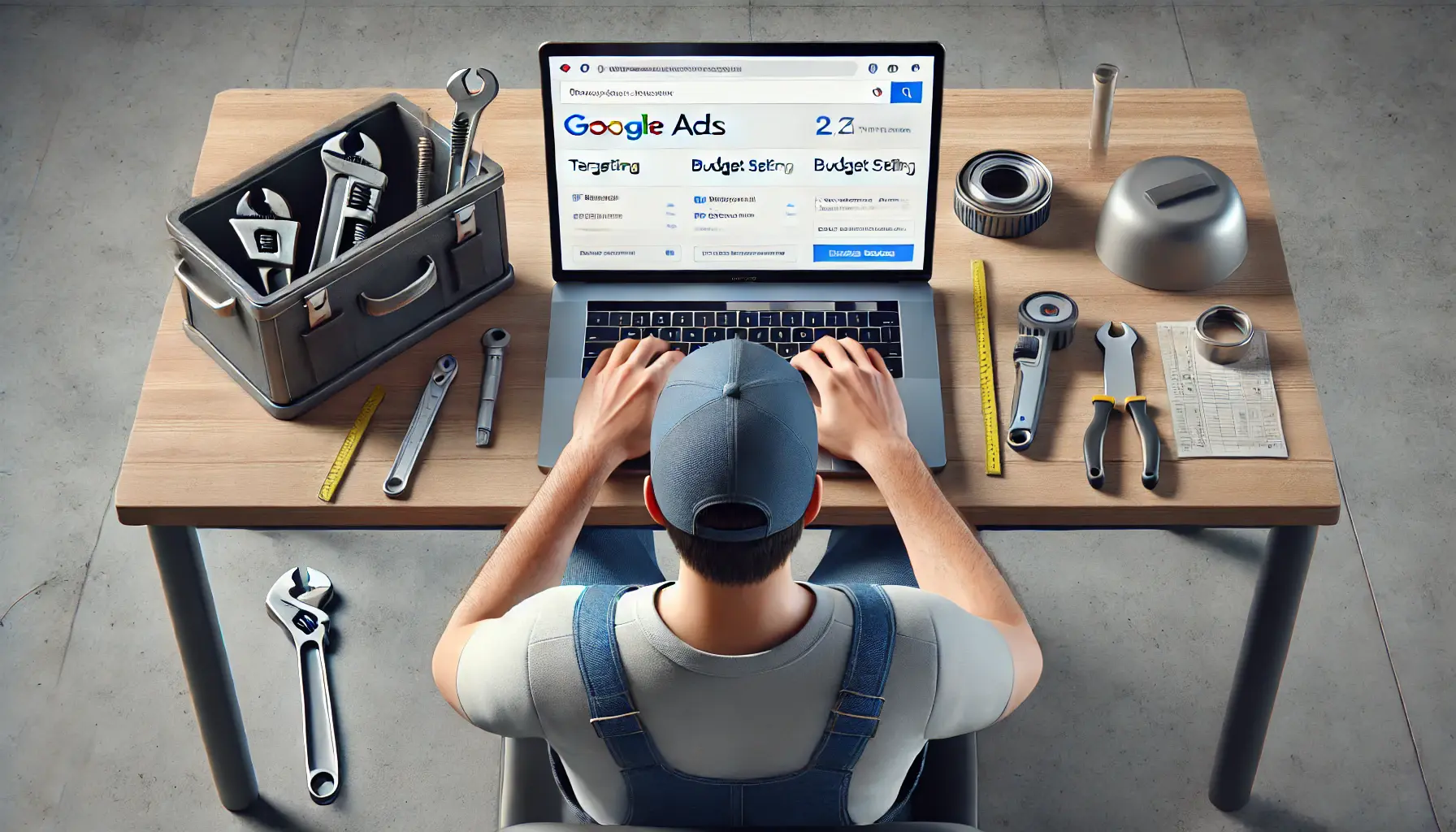
A plumber setting up a Google Ads campaign, combining digital marketing and plumbing expertise.
Setting Up Effective Google Ads Campaigns for Plumbing Services
Establishing a successful Google Ads campaign is crucial for plumbers aiming to attract local customers actively seeking plumbing services.
A well-structured campaign ensures your ads reach the right audience, maximizing your return on investment.
Let’s explore the essential steps to set up an effective Google Ads campaign tailored for plumbing services.
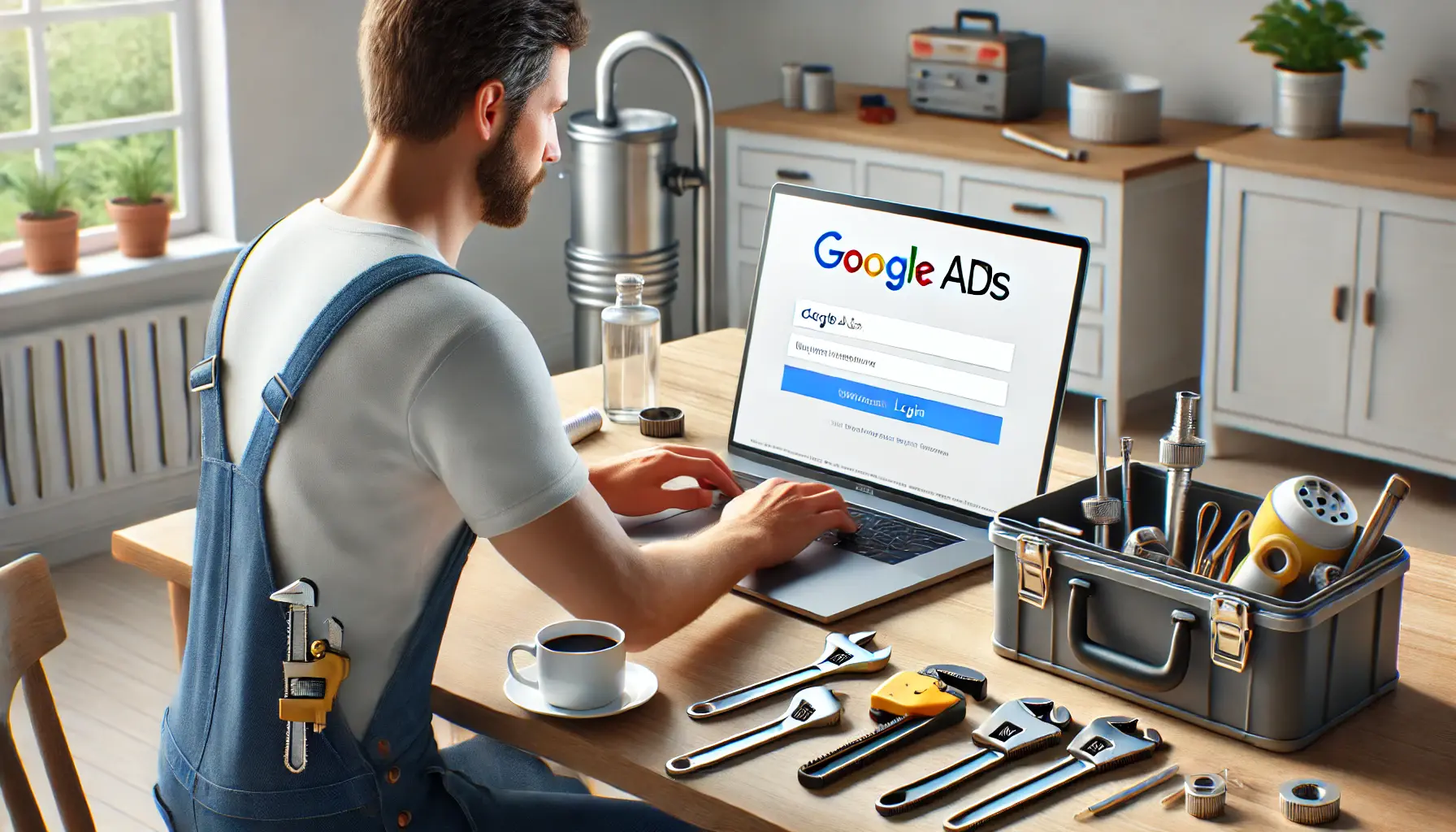
A plumber setting up a Google Ads account to start an online marketing campaign.
Creating a Google Ads Account for Your Plumbing Business
To begin, navigate to the Google Ads homepage and click on ‘Start now’.
Sign in with your existing Google account or create a new one dedicated to your business.
Once logged in, you’ll be prompted to set up your first campaign.
It’s advisable to switch to Expert ModeAn advanced setting in Google Ads that allows for detailed campaign customization and targeting options. to gain full control over your campaign settings, allowing for more precise targeting and customization.

A digital marketer evaluating the right Google Ads campaign types for a plumbing business.
Selecting the Right Campaign Type: Search, Display, or Local Services Ads
Google Ads offers various campaign types, each serving different purposes:
- Search Campaigns: Text ads that appear on Google search results when users search for relevant keywords. Ideal for reaching consumers actively searching for plumbing services.
- Display Campaigns: Visual ads shown across Google’s network of partner websites. Useful for creating brand awareness but may lack immediate intent targeting.
- Local Services Ads: Ads that appear at the top of search results, specifically designed for local service providers, including plumbers. These ads allow you to pay per lead rather than per click, ensuring you only invest in potential customers who contact you directly.
For plumbing businesses, starting with Search Campaigns and Local Services Ads is often the most effective strategy, as they target users actively seeking plumbing services in your area.

A digital marketer adjusting geographic targeting for a local plumbing service’s Google Ads campaign.
Defining Target Audiences and Geographic Locations
Precise targeting is essential to ensure your ads reach potential customers within your service area.
In the campaign settings:
- Location Targeting: Indicate your served areas, such as specific cities or a radius around your business location. This ensures your ads are shown to users searching for plumbing services within your operational area.
- Language Targeting: Select the languages spoken by your target audience to ensure your ads are relevant and understandable to potential customers.
By accurately defining your target audience and locations, you maximize the relevance of your ads, leading to higher engagement and conversion rates.

A digital marketer setting up a Google Ads budget and bidding strategy for a plumbing business.
Establishing a Budget and Bidding Strategy
Setting a realistic budget and choosing an appropriate bidding strategy are crucial for the success of your campaign:
- Daily Budget: Determine the maximum amount you’re willing to spend per day on your ads. This helps control costs and aligns your ad spend with your marketing budget.
- Bidding Strategy: Beginners may start with Manual CPC, allowing you to set a maximum bid for each click, ensuring controlled spending. As data is gathered, you can transition to automated bidding strategies like Maximize Conversions to optimize for leads.
Regularly monitor your budget and adjust bids based on ad performance to ensure optimal results.
Setting up your Google Ads campaign with these considerations positions your plumbing business to effectively reach potential customers, driving more leads and increasing your return on investment.
Next, we will look at how to create engaging ad copy and provide tips on using keywords.
Switch to Expert Mode in Google Ads to unlock full control over campaign settings and ensure precise targeting for plumbing services.
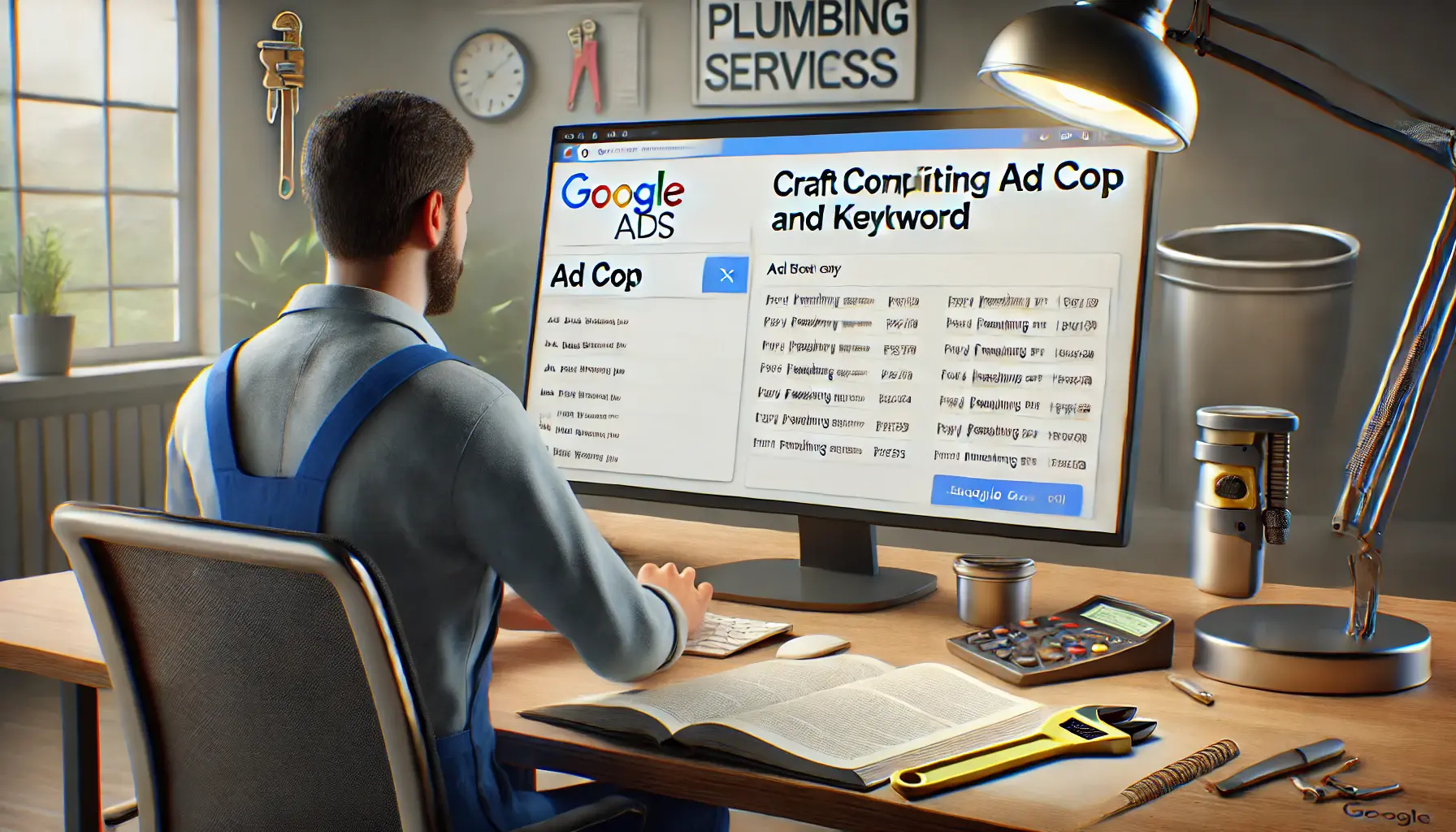
A digital marketer crafting compelling ad copy and selecting keywords for a plumbing business Google Ads campaign.
Crafting Compelling Ad Copy and Utilizing Keywords
Creating effective ad copy and selecting the right keywords are crucial components of a successful Google Ads campaign for plumbers.
Well-crafted ads paired with strategic keyword usage can significantly enhance your visibility and attract potential customers seeking plumbing services.

A digital marketer conducting keyword research for a plumbing business using a laptop.
Conducting Keyword Research Specific to Plumbing Services
Begin by identifying keywords that potential customers use when searching for plumbing services.
Use tools like Google Keyword PlannerA free tool from Google Ads that helps advertisers find relevant keywords and their search volumes. to find appropriate keywords and assess their search volumes.
Focus on a mix of:
- Short-Tail Keywords: General terms like “plumber” or “plumbing services”.
- Long-Tail Keywords: More specific phrases such as “emergency plumber in [city]” or “24-hour plumbing repair near me”.
Incorporating a combination of these keywords helps capture a broader audience while targeting specific customer needs.

A digital marketer focused on writing ad headlines and descriptions for a plumbing business’s Google Ads campaign.
Writing Effective Ad Headlines and Descriptions
Your ad copy should be clear, concise, and compelling.
Consider the following tips:
- Include Keywords: Integrate relevant keywords into your headlines and descriptions to improve ad relevance and quality scores.
- Highlight Unique Selling Propositions (USPs): Emphasize what sets your plumbing services apart, such as “licensed and insured plumbers” or “same-day service available”.
- Use Action-Oriented Language: Encourage users to take action with phrases like “Call Now” or “Schedule Your Service Today”.
Crafting ad copy that resonates with your target audience increases the likelihood of engagement and conversions.
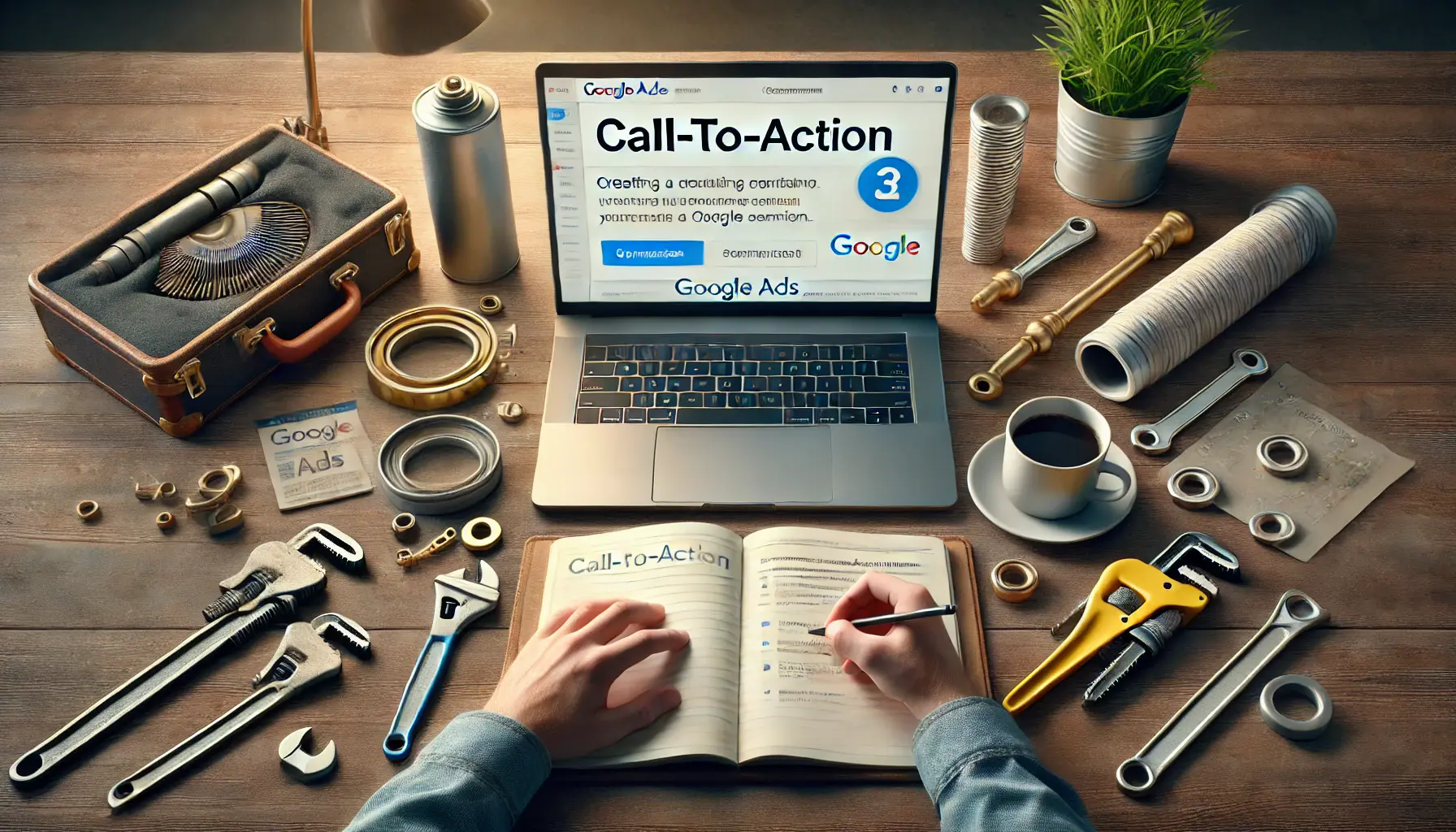
A digital marketer crafting a compelling call-to-action for a plumbing business’s Google Ads campaign.
Incorporating Call-to-Action Phrases to Drive Engagement
Effective call-to-action (CTA) phrases guide potential customers toward taking the desired action.
Examples include:
- “Book Your Appointment Now”
- “Get a Free Quote Today”
- “Contact Our Expert Plumbers”
Clear and compelling CTAs can significantly boost your ad’s performance by prompting immediate responses.
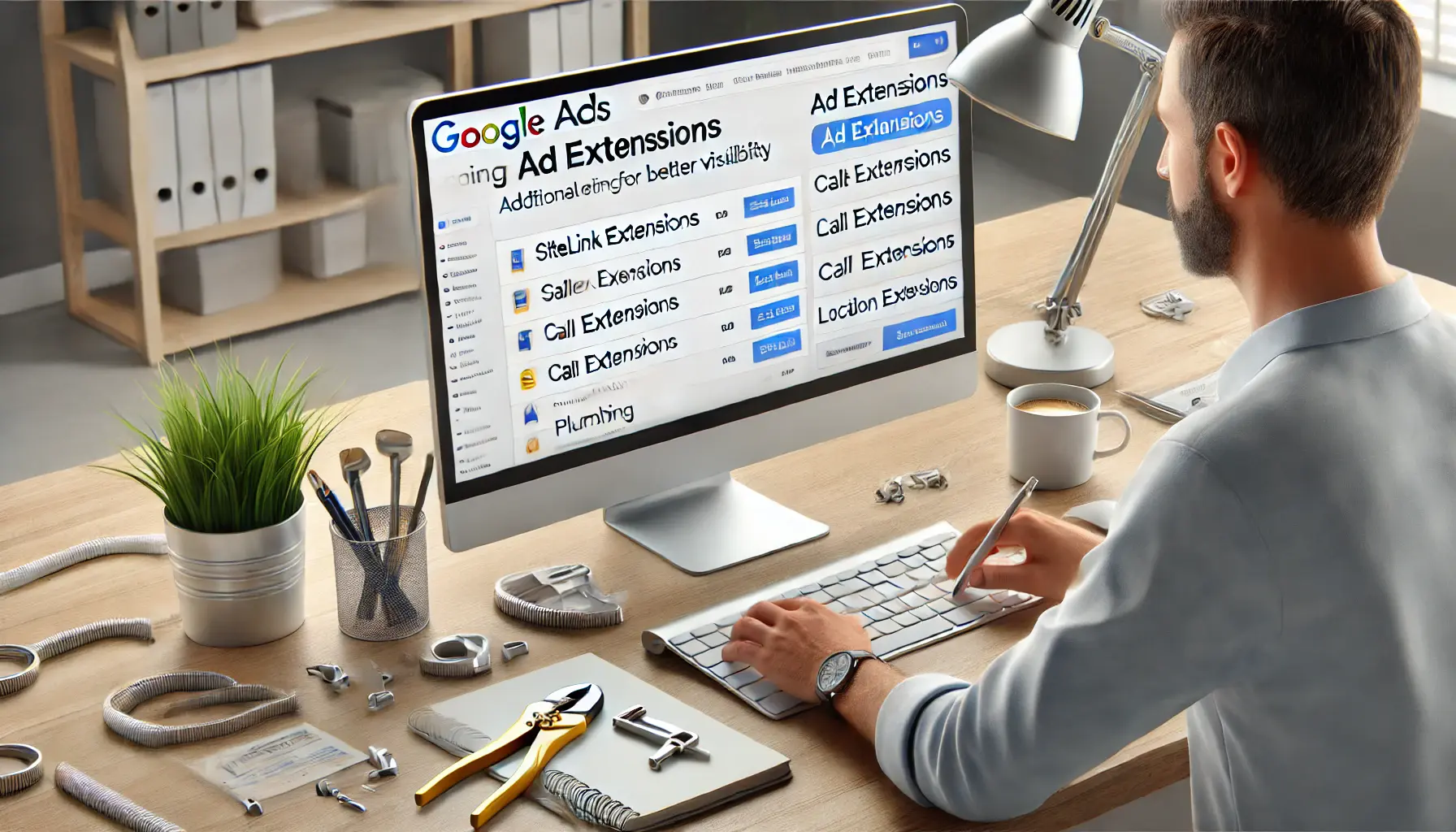
A digital marketer optimizing ad extensions for better visibility in a Google Ads campaign for a plumbing business.
Implementing Ad Extensions for Enhanced Visibility
Ad extensions provide additional information and increase your ad’s prominence.
Consider using:
- Sitelink Extensions: Send users directly to specific pages on your website, such as “Our Services” or “Customer Reviews”.
- Call Extensions: Display your phone number, allowing users to call directly from the ad.
- Location Extensions: Show your business address and help users find your location.
By applying ad extensions, you increase your ad’s click-through rate and give users more reasons to choose your plumbing services.
By crafting your ad copy and selecting keywords strategically, you enhance the effectiveness of your Google Ads campaign, driving more qualified leads to your plumbing business.
Next, we’ll dive into how to optimize landing pages for better conversions.
Strategic ad copy paired with relevant keywords increases engagement and boosts conversions for plumbing services.
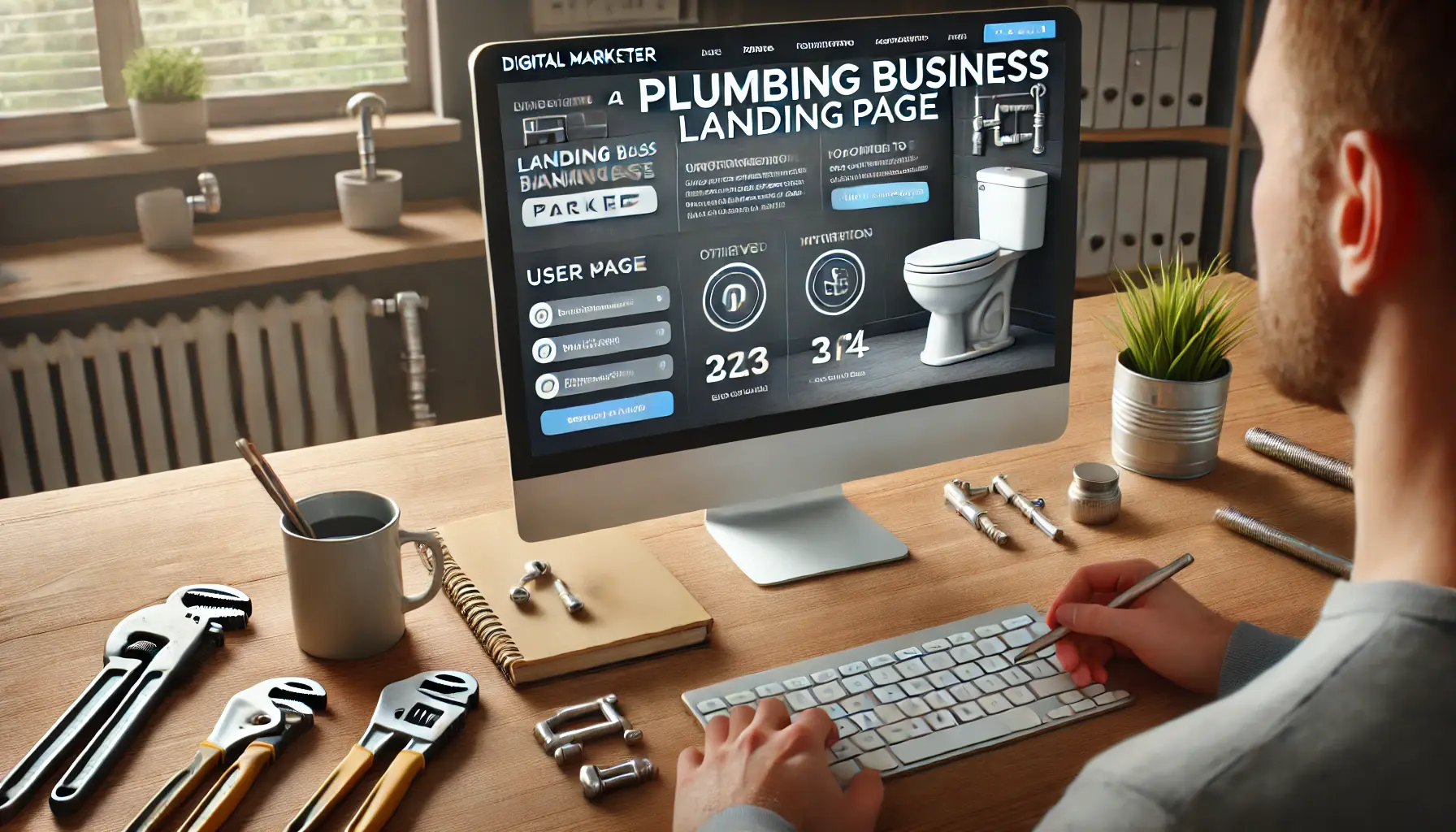
A digital marketer optimizing a landing page for higher conversion rates for a plumbing business.
Optimizing Landing Pages for Higher Conversion Rates
After clicking on your Google Ads, potential customers should be directed to a well-optimized landing page that converts their interest into action.
For plumbers, an optimized landing page can significantly increase the number of leads and appointments.
Let’s explore key strategies to enhance your landing page’s performance.
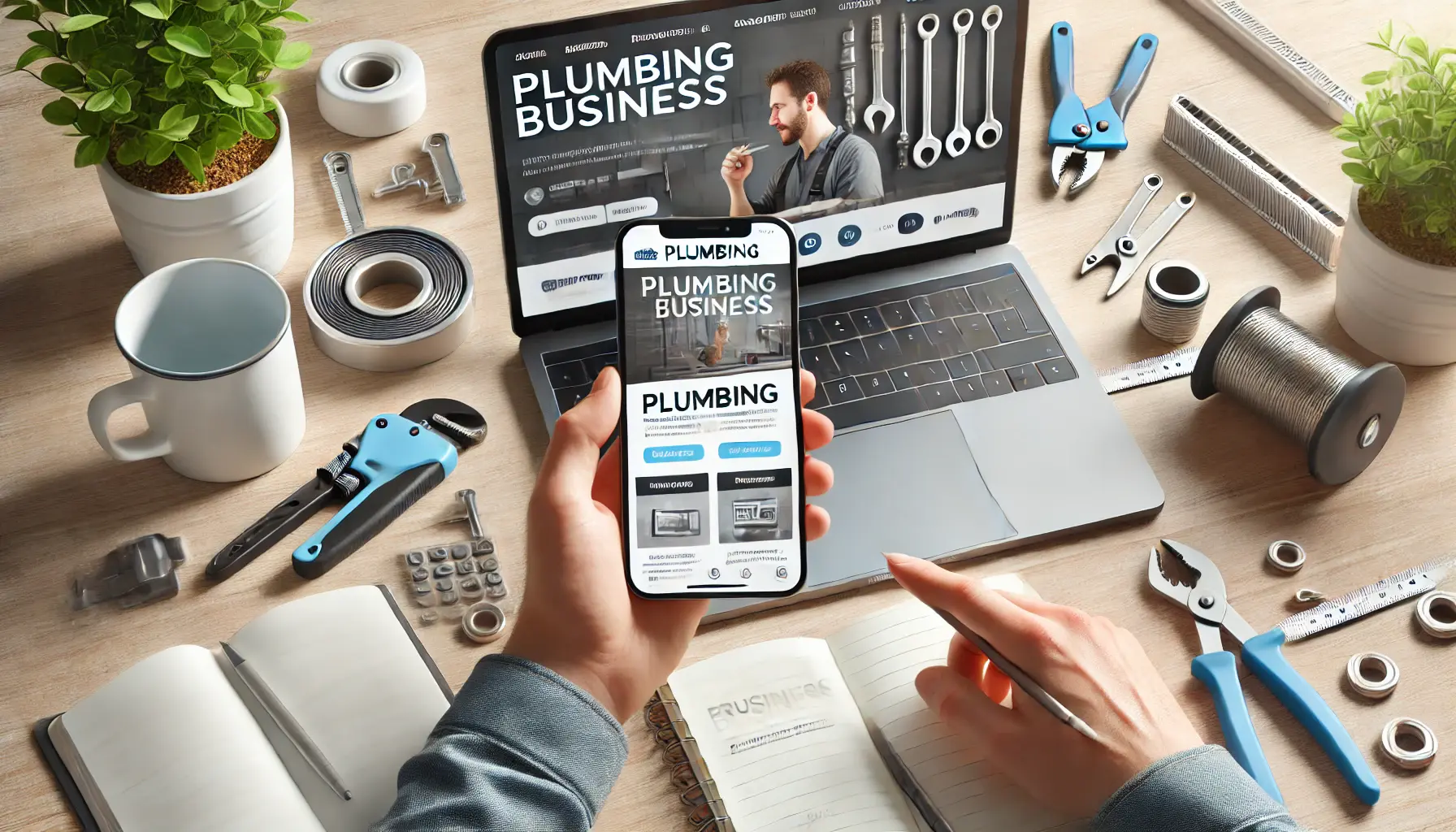
A digital marketer ensuring a plumbing business website is mobile-responsive and user-friendly on a smartphone.
Designing User-Friendly and Mobile-Responsive Pages
In today’s digital age, many users search for services on their mobile devices.
Ensuring your landing page is mobile-responsive is crucial.
A user-friendly design includes:
- Clean Layout: Avoid clutter by using ample white space and clear headings to guide users.
- Fast Loading Times: Optimize images and minimize code to ensure quick page loads, reducing bounce rates.
- Easy Navigation: Ensure that users can easily find information without excessive scrolling or clicking.
By focusing on these design elements, you create a seamless experience that encourages visitors to stay and take action.
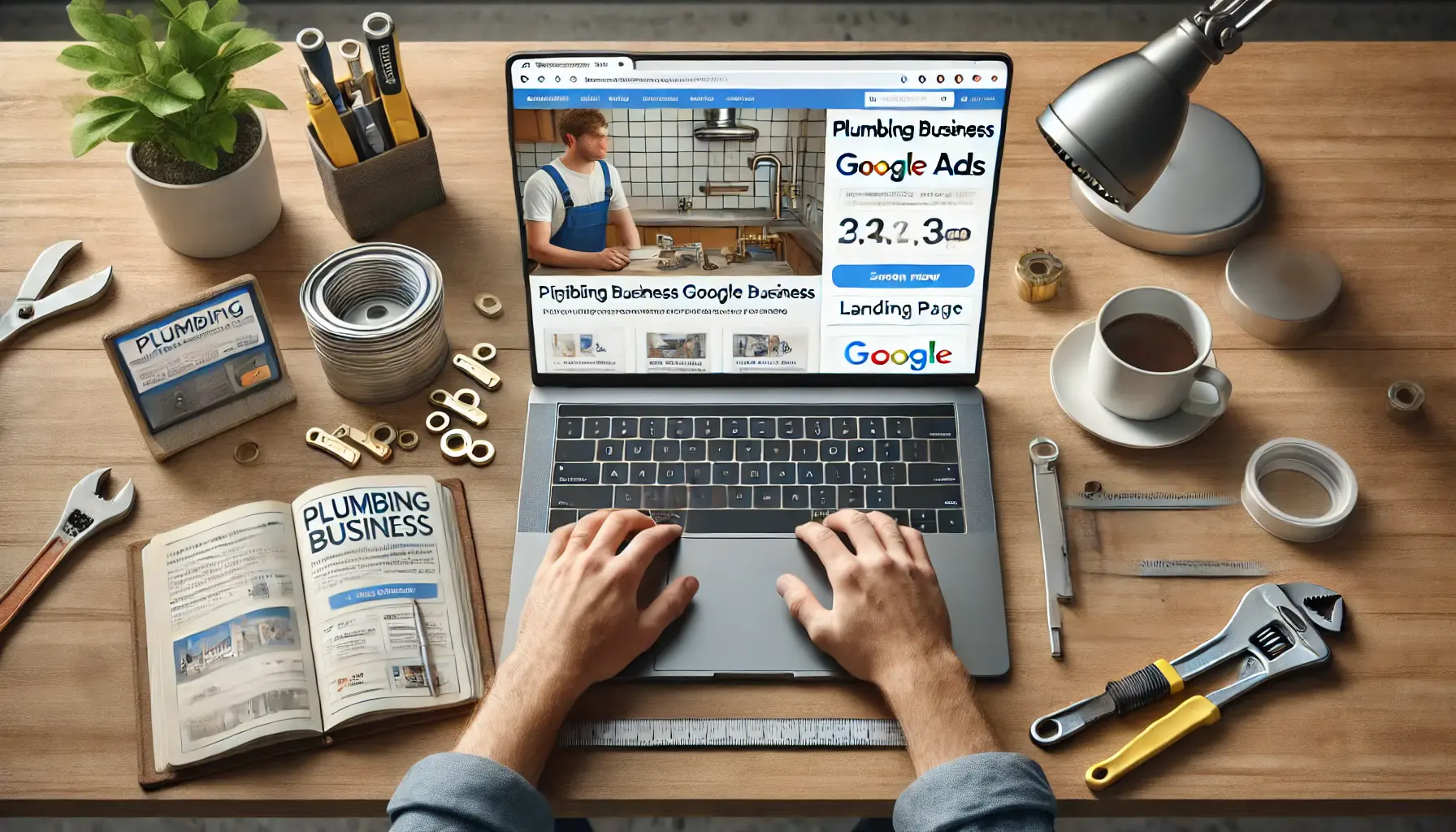
A digital marketer ensuring consistency between a Google Ads campaign and its corresponding landing page for a plumbing business.
Ensuring Consistency Between Ads and Landing Page Content
Consistency between your ad copy and landing page content is vital.
This alignment, known as message matching, reassures visitors that they’ve arrived at the right place.
To achieve this:
- Match Headlines: Use the same or similar headlines in both your ad and landing page.
- Reflect Ad Offers: If your ad mentions a special offer, ensure it’s prominently displayed on the landing page.
- Maintain Visual Consistency: Use similar colors, fonts, and imagery to create a cohesive experience.
By maintaining consistency, you build trust and reduce confusion, leading to higher conversion rates.
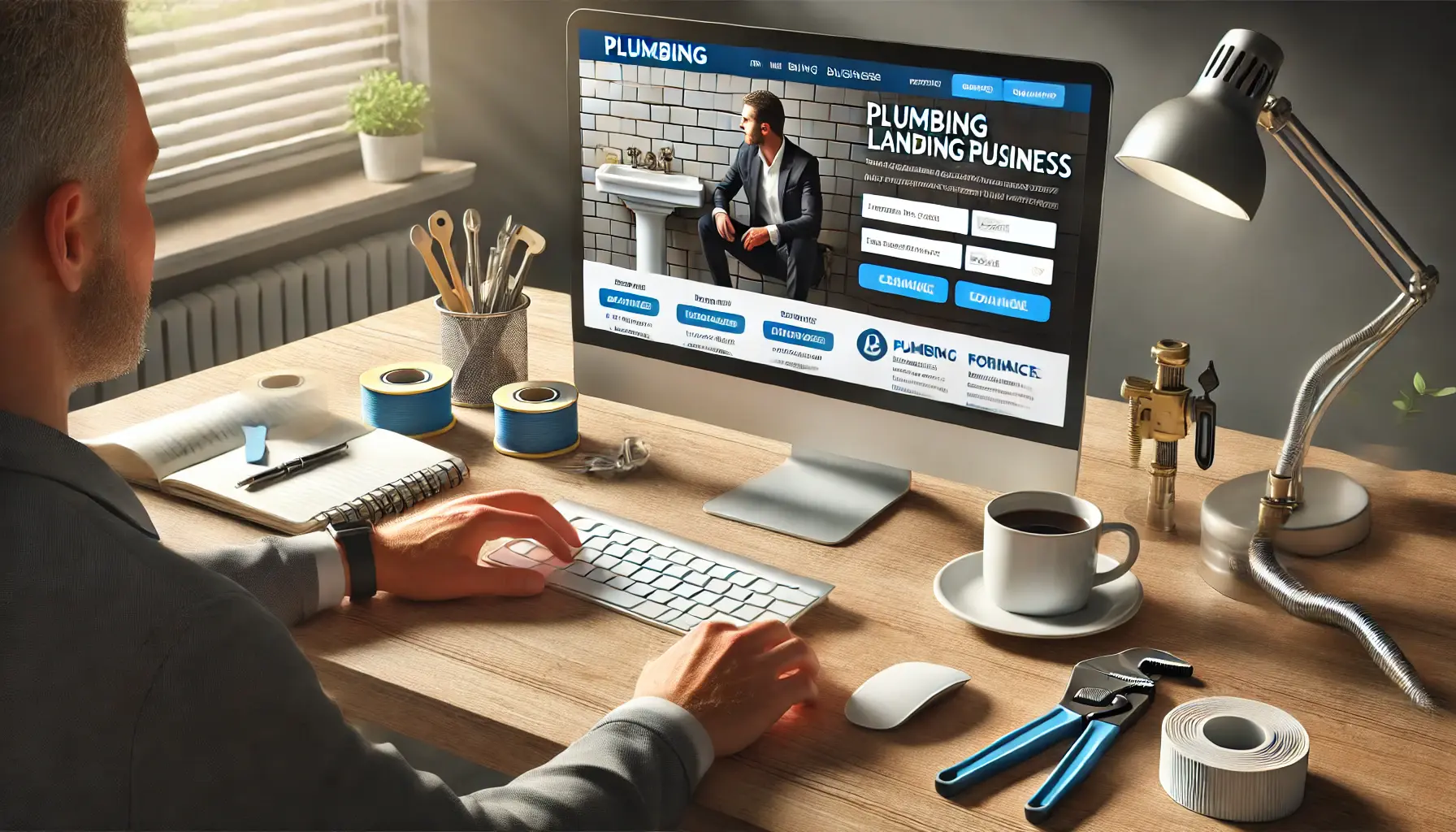
A digital marketer ensuring clear calls-to-action and contact information on a plumbing business landing page.
Incorporating Clear Calls-to-Action and Contact Information
Your landing page should guide visitors toward taking a specific action.
Effective strategies include:
- Prominent Calls-to-Action (CTAs): Use clear, action-oriented language like “Schedule Your Service Today” or “Get a Free Quote Now”.
- Visible Contact Information: Display your phone number and email address prominently, allowing users to reach out easily.
- Contact Forms: Include simple forms for users to request services or ask questions, capturing essential lead information.
By providing clear CTAs and accessible contact options, you make it easy for potential customers to engage with your plumbing services.

A digital marketer analyzing trust signals on a plumbing business website to build credibility.
Utilizing Trust Signals to Build Credibility
Building trust is essential, especially in service industries like plumbing.
Include the following trust signals:
- Customer Testimonials: Showcase positive feedback from satisfied clients to prove your reliability.
- Certifications and Licenses: Display any professional credentials to highlight your qualifications.
- Guarantees: Offer satisfaction guarantees or warranties to reassure potential customers.
These elements can significantly enhance your credibility and encourage visitors to choose your services over competitors.
By implementing these optimization strategies, your landing pages will be more effective in converting visitors into leads, ultimately boosting your plumbing business’s success.
Next, we will review how to monitor and analyze your Google Ads performance to ensure ongoing optimization.
A mobile-responsive, user-friendly landing page aligned with ad content improves user experience and boosts conversions.
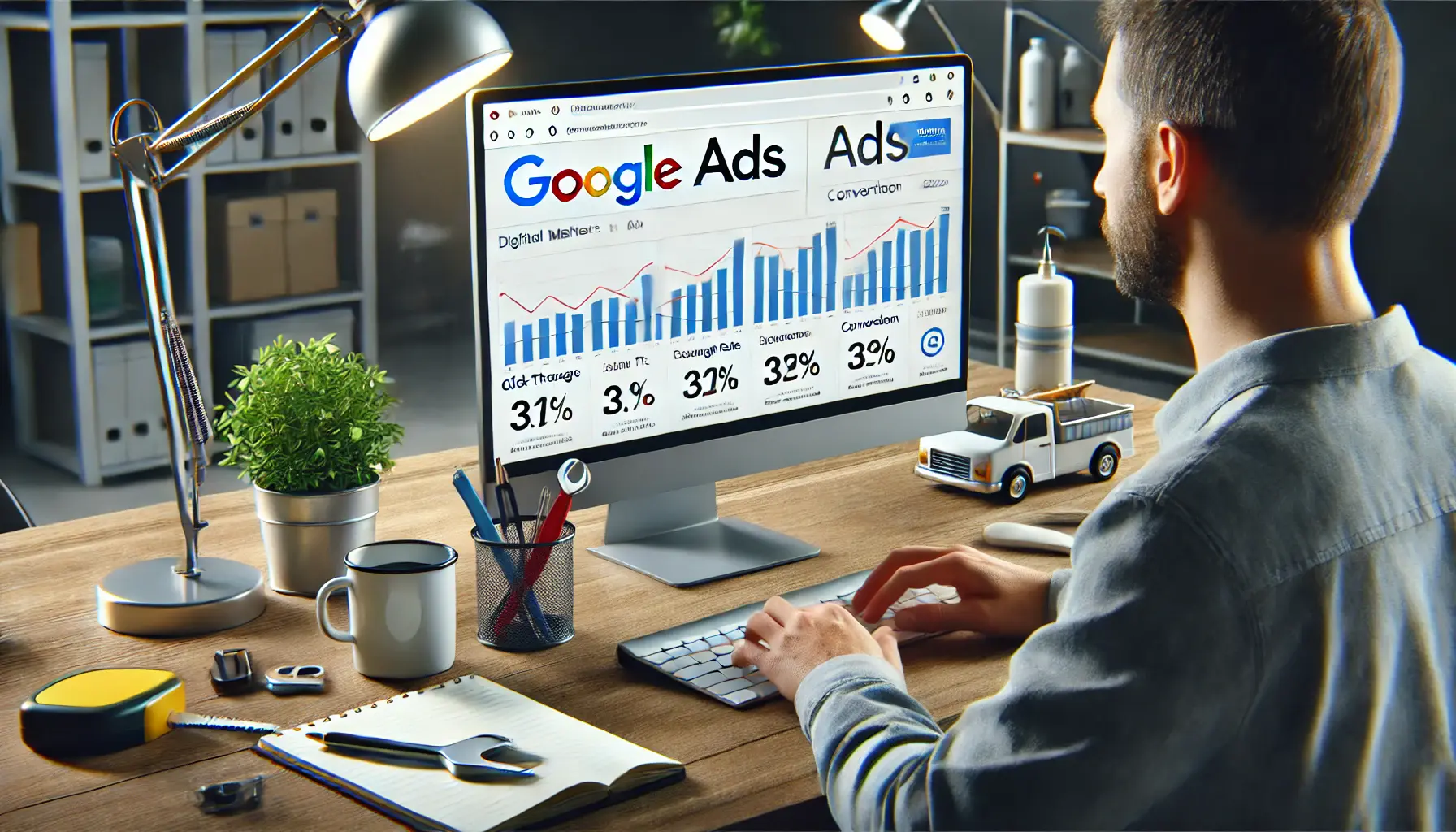
A digital marketer analyzing Google Ads performance metrics for a plumbing business.
Monitoring and Analyzing Your Google Ads Performance
To ensure the success of your Google Ads campaigns for plumbing services, it’s essential to continuously monitor and analyze their performance.
This ongoing evaluation allows you to make informed adjustments, optimize your strategies, and maximize your return on investment.
Let’s explore the key steps in effectively tracking and analyzing your campaigns.
A digital marketer configuring conversion tracking for a plumbing business’s Google Ads campaign.
Setting Up Conversion Tracking
Implementing conversion trackingA method in digital marketing to measure user actions like form submissions or purchases after interacting with an ad. is crucial for understanding how users interact with your ads and which actions they take.
For plumbers, valuable conversions might include:
- Contact Form Submissions: Users filling out a form to request services or inquiries.
- Phone Calls: Potential customers calling your business directly from the ad.
- Appointment Bookings: Scheduling services through your website.
By setting up conversion tracking, you can identify which ads and keywords are driving valuable actions, allowing for more informed decision-making.

undefined
Utilizing Google Analytics for In-Depth Insights
Integrating Google Analytics with your Google Ads account provides a comprehensive view of user behavior on your website.
This integration allows you to:
- Analyze User Flow: Understand how visitors navigate your site after clicking on your ad.
- Measure Engagement Metrics: Track metrics such as bounce rate, average session duration, and pages per session.
- Identify High-Performing Pages: Determine which landing pages lead to the most conversions.
These insights help you refine your website and ad strategies to better meet user needs and improve conversion rates.

A digital marketer reviewing key performance metrics to evaluate the success of a plumbing business’s marketing efforts.
Evaluating Key Performance Metrics
Regularly reviewing key performance indicators (KPIs) is essential for assessing the effectiveness of your campaigns.
Main indicators to track include:
- Click-Through Rate (CTR): The percentage of people that click on your ad after seeing it. A high CTR implies that your ad is highly relevant and engaging.
- Cost Per Click (CPC): The average amount paid by an advertiser for each ad click. Monitoring CPC helps you manage your budget effectively.
- Conversion Rate: The percentage of clicks that result in a desired action, such as a contact form submission or phone call.
- Return on Ad Spend (ROAS): Measures the revenue generated for every dollar spent on advertising.
By analyzing these metrics, you can identify areas for improvement and allocate resources more efficiently.

A digital marketer adjusting a Google Ads campaign based on performance data for a plumbing business.
Making Data-Driven Adjustments to Your Campaigns
Based on your performance analysis, consider implementing the following adjustments:
- Refine Keywords: Identify high-performing keywords and allocate more budget to them, while pausing or adjusting bids on underperforming ones.
- Optimize Ad Copy: Test different headlines and descriptions to see which resonate best with your audience.
- Adjust Bidding Strategies: Experiment with automated bidding options, such as Target CPA or Maximize Conversions, to improve efficiency.
- Enhance Landing Pages: Use insights from user behavior to make your landing pages more user-friendly and conversion-focused.
Regularly updating and optimizing your campaigns based on data ensures sustained success and growth for your plumbing business.
By diligently monitoring and analyzing your Google Ads performance, you can make informed decisions that enhance your advertising efforts, attract more qualified leads, and ultimately grow your plumbing business.
Regularly track KPIs like CTRClick-Through Rate, the percentage of ad impressions that result in clicks., CPCCost Per Click, the amount an advertiser pays for each click on their ad., and ROASReturn on Ad Spend, a metric that measures revenue generated for every dollar spent on advertising. to ensure your Google Ads campaigns are on track and optimized for success.
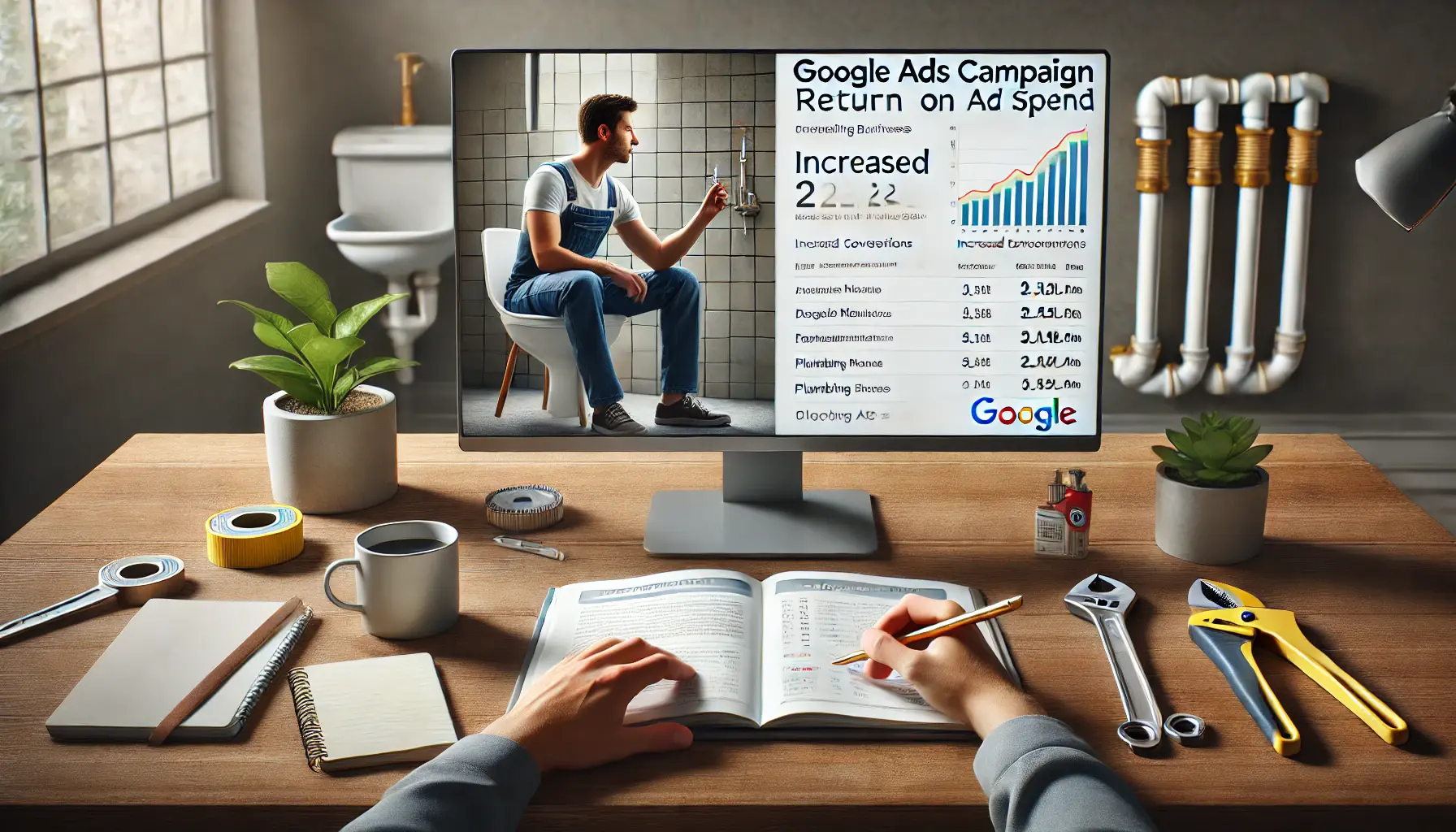
A digital marketer reviewing the success of a plumbing business’s Google Ads campaign to maximize business growth.
Maximizing Plumbing Business Success with Google Ads
The unparalleled opportunity for plumbers to connect with potential customers actively seeking plumbing services lies in Google Ads.
Setting up your campaigns, optimizing landing pages, and monitoring performance all play critical roles in ensuring the success of your marketing efforts.
By strategically using Google Ads, you can enhance visibility, build trust, and drive conversions effectively.

A digital marketer analyzing key takeaways from a Google Ads campaign to optimize a plumbing business’s marketing efforts.
Key Takeaways for Plumbers Using Google Ads
Throughout this guide, we’ve explored essential strategies and best practices for running successful Google Ads campaigns.
Here’s a summary of the key points to keep in mind:
- Set Up Thoughtfully: Start with a structured approach by selecting the right campaign type and defining your target audience and location.
- Craft Compelling Ad Copy: Focus on creating engaging headlines, incorporating relevant keywords, and using clear calls-to-action to drive engagement.
- Optimize Landing Pages: Ensure your pages are mobile-responsive, user-friendly, and aligned with your ad copy to provide a seamless user experience.
- Monitor Performance: Use tools like Google Analytics and conversion tracking to measure results and refine your strategies.
- Adapt and Improve: Regularly analyze performance metrics such as CTR, CPC, and ROAS to make data-driven adjustments for sustained success.

A plumber analyzing the importance of Google Ads in growing a plumbing business.
Why Google Ads Is Essential for Plumbers
In an industry where visibility and trust are paramount, Google Ads provides plumbers with the tools needed to stand out in a competitive market.
Its precision targeting ensures you connect with the right audience at the right time, while its measurable results allow you to continuously optimize your campaigns.
By leveraging Google Ads, plumbers can take control of their marketing efforts, reach more customers, and grow their businesses efficiently.
Whether you are a seasoned advertiser or new to digital marketing, following these best practices will help you achieve your goals and maximize the impact of your advertising efforts.
In conclusion, the power of Google Ads lies in its ability to deliver highly targeted, actionable results.
With thoughtful planning and continuous optimization, plumbers can turn Google Ads into a predictable and profitable marketing channel, ensuring long-term success in the competitive home services market.
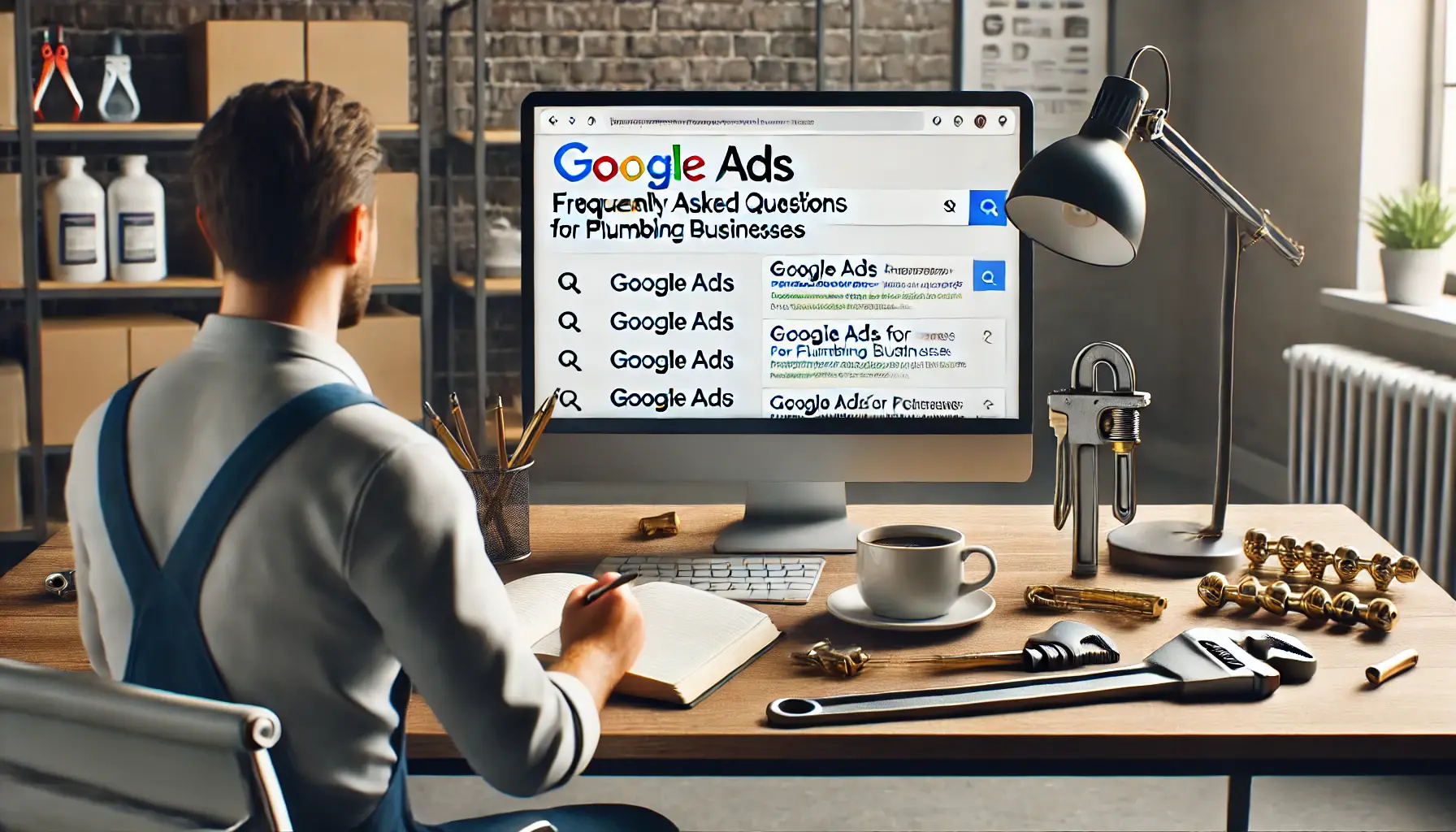
A digital marketer exploring frequently asked questions about Google Ads to help plumbing businesses.
Your campaigns can be managed by an agency specialized in Google Ads, check out our service page.
Frequently Asked Questions About Google Ads for Plumbers
Addressing common inquiries can help plumbers effectively utilize Google Ads to enhance their business visibility and attract more clients.
Google Ads offers immediate visibility, precise targeting, and measurable results, enabling plumbers to reach potential customers actively searching for plumbing services.
Plumbers can create a Google Ads account, choose relevant campaign types such as Search or Local Services Ads, define target audiences, set budgets, and write compelling ad copy.
Plumbers should use a mix of short-tail keywords like ‘plumber’ and long-tail keywords such as ’emergency plumber in [city]’ to capture a broader audience.
Ensure landing pages are mobile-responsive, user-friendly, consistent with ad content, and include clear calls-to-action and contact information.













